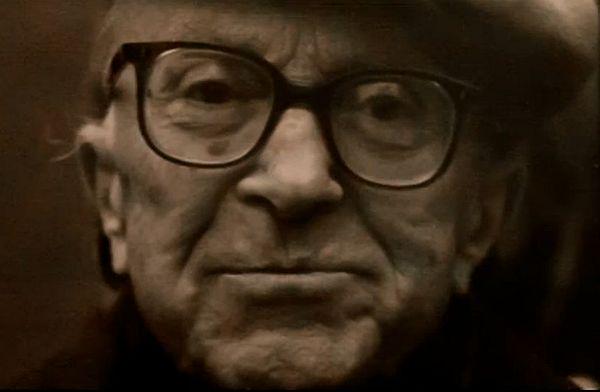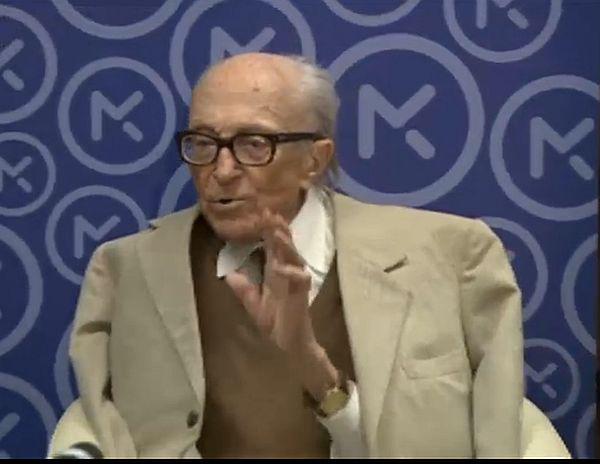Boris Pahor was awarded the 2013 European Citizen's Prize by the European Parliament. The prize is given to individuals and groups in recognition of their contribution to mutual understanding and closer ties between nations in the European Union. Mr Pahor will receive his prize in Slovenia at the end of August when he celebrates his 100th birthday. Mr Pahor was nominated for this prize by all Slovenian MEPs who said that "as a critical writer and a great intellectual he has had an invaluable impact on the Slovenian language and on the cultural development of the area between Italy and Slovenia". For the slomedia.it portal, Mr Pahor expressed his satisfaction at receiving this honour. "When the European Parliament, through my person, recognises the existence of our culture and the validity of the European spirit in Slovenians, then this comes as a great satisfaction experienced not only by me, but by all of us, as I am the son of the people of Trieste and Primorska. This is an honour for all our culture and the level of our European culture," he said.


His novel "Mesto v zalivu" (The City in the Bay) was published in French this April under the title "Quand Ulysse revient à Trieste".
To mark his birthday, a symposium called Pahoriana was organised in April 2013 at Cankarjev Dom Cultural and Congress Centre in Ljubljana. The participants analysing Pahor's work described it as multilayered and omnipresent, important for jogging our memory of history, and a significant testimony for future generations.
At the end of the symposium, Mr Pahor thanked Evgen Bavčar (a Slovenian essayist, publisher, philosopher and photographer), saying that without Mr Bavčar this symposium would never have taken place and his works would never have been translated. Mr Pahor added that the credit for making his work more visible also goes to French publisher Pierre-Guillaume de Roux, who after "listening to two men praising this book" arranged for "Nekropola" (Pilgrim among the Shadows) to be translated into French.
"Primus erat Bavčar, secundus erat Pierre-Guillaume. It is thanks to them that I became a person so talked about. First in France, New York and Germany and only then in Italy and so on," stressed Mr Pahor. Throughout the symposium he kept saying that he actually should not have been present. "This was supposed to be a speech about me, but after I am gone," he joked while expressing his great pleasure with the event.
Pahor's roots
Boris Pahor, born on 26 August in Trieste, is considered one of the best known Slovenian writers. His fame in Europe stems from publications about the atrocities in Nazi concentration camps, but in Slovenia and among Slovenian minority in Italy he is well known for his social and political engagement, in addition to his writing. "Nekropola" (Pilgrim among the Shadows), the collection of novels entitled "Grmada v pristanu" (The Bonfire in the Quay), and the novels "Nomadi brez oaze" (Nomades without an Oasis) and "Spopad s pomladjo" (A Difficult Spring) are Pahor's most popular books. Mr Pahor was nevertheless first noted abroad, and only later in Slovenia.
Boris Pahor claims that for him writing "is a way to reconfirm my own roots. The happiness of finding my own identity over and over again. At the same time, writing evolved into healing, a way to release everything that is bottled up in me. 'Release' is a strong word but I believe that it conveys what it means to free oneself from the fear of death."
In anticipation of his 100th birthday, La Repubblica (after Milan's Il Corriere della Sera, La Repubblica is the most influential Italian daily with the highest circulation) published a two-page interview with Mr Pahor in which he announced that a special event marking his 100th birthday would be organised in Ljubljana on 26 August, and a special book published about his life and work.
He also talks at length about his childhood marred by the Fascist arson attack on Narodni Dom, a Slovenian cultural centre in Trieste, that signalled the beginning of attacks on everything Slovenian over a long period of time. The Slovenian language was banned. Slovenians were forced to use Italian in written and spoken communication, Slovenian books were burned, and children in schools were no longer allowed to declare themselves Slovenian. All of this filled Pahor with suffering, fear and shame. He also speaks about his father, a travelling salesman who sold butter, cottage cheese and honey. He does not forget to mention his experience from Benghazi in Africa where he completed secondary school. Until September 1943 he worked as a translator for a military information service. After Italy's capitulation on 8 September 1943, he returned as a civilian to Trieste where he joined the resistance movement.
No great expectations for the future
In his interview for La Repubblica, Boris Pahor speaks about his attitude towards death for the first time. "I am afraid that I will have to say goodbye. I think eternity is a great void. You can find solace in Catholicism but for that you have to have faith," said Mr Pahor and went on to answer the question whether he was a religious person by saying, "Learning to love and forgive is what I like about Catholicism, but there is not only one Jesus; there are millions of suffering people, millions of Jesuses. If God is so almighty and good, why has he let all this happen?"
In his opinion, he lives a solitary life: he gets up at half past six and at seven o'clock listens to the Slovenian radio broadcast in Trieste. He is not fond of social life or salon-style parties. He does not eat much, but writes and occasionally goes for a walk. If he has to go somewhere, he takes the bus. If he has to see someone, he prefers that the meeting take place in the back room at Lukša bar in Prosecco near Trieste, a kind of a sanctuary for him.
He has no great expectations for the future, not even for an individual or humanity. "For me it is enough just to remember everything that happened in the 20th century so that I can say to myself: Boris, if you exist in order to talk and be heard by certain people, you are not alone and not completely ruined."
Valerija Obu, SINFO
Boris Pahor was awarded the 2013 European Citizen's Prize by the European Parliament. The prize is given to individuals and groups in recognition of their contribution to mutual understanding and closer ties between nations in the European Union. Mr Pahor will receive his prize in Slovenia at the end of August when he celebrates his 100th birthday. Mr Pahor was nominated for this prize by all Slovenian MEPs who said that "as a critical writer and a great intellectual he has had an invaluable impact on the Slovenian language and on the cultural development of the area between Italy and Slovenia". For the slomedia.it portal, Mr Pahor expressed his satisfaction at receiving this honour. "When the European Parliament, through my person, recognises the existence of our culture and the validity of the European spirit in Slovenians, then this comes as a great satisfaction experienced not only by me, but by all of us, as I am the son of the people of Trieste and Primorska. This is an honour for all our culture and the level of our European culture," he said.


































































